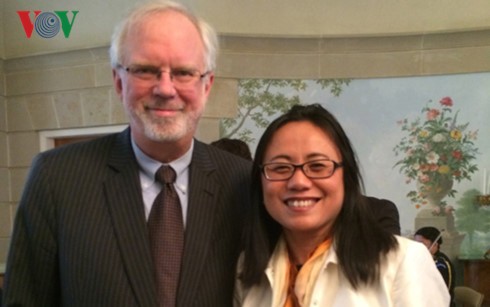(VOVword)- In addition to economic cooperation, educational exchange has emerged as a prime focus in Vietnam-US relations. Nearly 17,000 Vietnamese attending tertiary and postgraduate courses in the US and those participating in training of trainers’ programs form a competent workforce for Vietnam.
 |
| The then Secretary of HCM City's Party Committee Le Thanh Hai hands investment certificate of the Fulbright University Vietnam to Thomas Vallely |
July, 10, 2015 marked a milestone in Vietnam-US educational cooperation when the Fulbright University Vietnam was officially certified at a ceremony in New York City watched by visiting Party General Secretary Nguyen Phu Trong.
Construction of the 70-million USD institution begins this year in Ho Chi Minh city’s high tech park. This is the first private non-profit university in Vietnam, which gives priority to employing excellent domestic scholars and scientists. Former US Ambassador to Vietnam Micheal Michalak said encouraging the participation of international educational institutions is a necessary step for today’s Vietnam: “We are trying to get more foreign universities to establish universities in Vietnam. It’s extremely important. Harvard has started with the Fulbright University down in HCM city. I know many other American universities that would like to set up branches in Vietnam. You need to do some reform, I think, to allow those things to happen”.
Vietnam now ranks top in ASEAN and 8th in the world in terms of sending students to the US. Obtaining an advanced education and having opportunities to gain work experience at US companies, these students will become a crucial part of workforce in Vietnam’s development. Vo Hoang An, a former student in the US and now working for a US company, said: “Young people want to be engaged in more activities. As we finished our studies here in the US, we want to learn something more than what we learned at schools. That’s why many graduates choose to work or to become interns for a couple of years before returning to Vietnam. I will come back home when I am most ready to serve my country”.
 |
| Ms. Sandy Dang and former US ambassador to Vietnam David Shear |
Although the majority of students pay the study fees, the others are able to access a world-class education thanks to the US government’s scholarship programs represented by the Vietnam Education Fund (VEF). Established by the US Congress in 2000, the VEF belongs to the US government and operates mostly in postgraduate educational exchanges with an annual budget of 5 million USD. To date, the VEF has funded more than 500 scholarships for young Vietnamese talents to pursue scientific and technological research. 300 of the scholarship recipients have completed their PhD studies. The VEF also provides funding for more than 30 US professors to go to teach in Vietnam’s universities, particularly in medical institutions. Sandy Dang, Managing Director the VEF, says education helps to bring the US and Vietnam closer: “I think education is extremely important. The role of education in the last 20 years, the education exchange between the US and Vietnam has helped build and strengthen the relationship between the US and Vietnam. Education exchange has really helped put Vietnam’s students in the most prestigious universities in the US. And the bring so much of the culture exchange as well as knowledge. And at the same time, they can learn about science, technologies and other aspects of American society, American way of life, culture and they also bring it back to Vietnam. Overall, education exchange is really a great way to bring the two countries together”.
Besides funding scholarships, the VEF works with US universities to evaluate Vietnam’s undergraduate and postgraduate education. By doing so, it may advise the Vietnamese government on solutions to meeting domestic educational reform. American universities are working on a model which combines the US education system with Vietnamese conditions, like self-reliance on curriculum and finance in order to create a more open and dynamic learning environment. Ms. Sandy Dang says: “And I think that’s very exciting because it’s not just taking something from the US and things that will replicate in Vietnam but also building from the organic, rights? And I think that is very exciting, very important and will be a way to help Vietnam to build a model that truly meets the need of Vietnam”.
The US government has hosted a series of educational exchange programs with Vietnam, including the Fulbright scholarship program, teaching English to high school and university teachers and the Young Southeast Asian Leaders Initiative launched by US President Barack Obama.